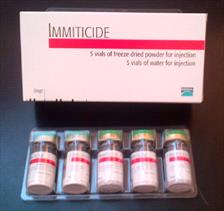
Photo by Dr. John Daugherty
Immiticide treatment usually is administered in two injections; the second dose is dispensed 24 hours after the first dose is given. If the heartworm infestation is severe, three doses are needed. The first injection is immediately administered, and the second injection is given 30 days later. A third injection is given 24 hours after the second injection. This schedule allows young heartworms to grow into adulthood, the life stage that Immiticide targets.
Dr. Shelby Wolfe has as many as 30 dogs in a Florida shelter awaiting Immiticide (melarsomine dihydrochloride).
The only FDA-approved adulticide to treat heartworm infestations is on backorder — again.
“This drug’s pretty important to us,” said Wolfe, veterinary services director at Halifax Humane Society, near Daytona Beach. “We’ve got a lot of heartworm-positive dogs coming through here. Without heartworm treatment, these dogs might not get adopted.”
The humane society sees roughly 120 dogs a year that need Immiticide, manufactured by Merial, Inc. Wolfe has relayed the shortage to owners, including several clients who are veterans suffering from posttraumatic stress and are exceedingly worried about their pets.
"This has created a lot of anxiety for them," she said.
The same could be said for veterinarians and owners across the country. Heartworm in dogs is easily preventable with medication, but treatment can be tricky. All dogs with heartworm disease are at risk for post-treatment pulmonary thromboembolism (a blockage of a main lung artery caused, in this case, by dead worms), which usually presents as acute dyspnea. An infected dog must be restricted from heavy exercise because an increased heart rate could send fragments of dead worms into the blood vessels, a sometimes fatal condition.
Merial spokeswoman Natasha Mahanes promises the Immiticide backorder will be brief. "We expect to fulfill backorders within a few weeks," she said by email.
Mahanes attributed the current supply troubles to an "unexpected increase in usage." Simply, company projections were off, she noted.
That's not due to a marked surge in heartworm incidence, the American Heartworm Society spokeswoman Sue O'Brien said. "However, spring is the season when many pets are tested for heartworm, so an increase in dogs being treated is certainly possible," she added.
Immiticide supplies have been erratic since 2009, when Merial first announced troubles with the U.S. supplier of its active ingredient, melarsomine. Problems resurfaced in August 2011, when Merial warned veterinarians of new manufacturing woes. Veterinarians reacted by stockpiling the drug, and supplies were depleted in a week.
Merial responded by implementing a restricted distribution program that requires veterinarians to call and order the drug on a case-by-case basis; they no longer can order it through distributors to stock their clinic inventories.
During Immiticide backorders, the American Heartworm Society recommends a 60-day pre-treatment period during which the infected dog is given a heartworm preventative (generally ivermectin) and doxycycline or minocycline before administering melarsomine. The course of treatment, experts say, has been shown to reduce pathology, adult heartworm numbers and the infective potential of microfilaria in canine patients. It also provides a two-month window of time between the dog's diagnosis and when Immiticide is needed.
O'Brien stressed that any regimen without melarsomine should be used only when "absolutely necessary."
Merial's Mahanes said that once supplies normalize, orders will be filled on a first-come basis.